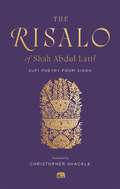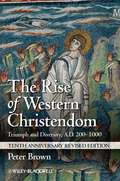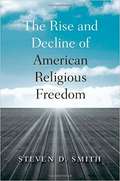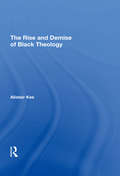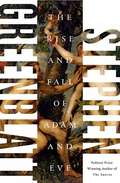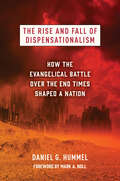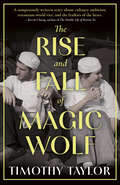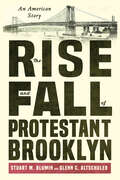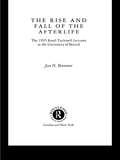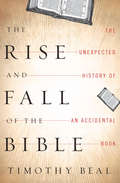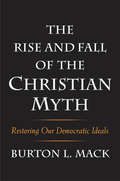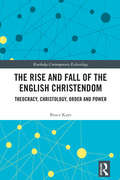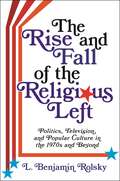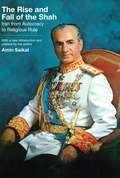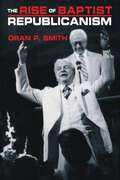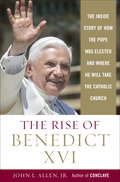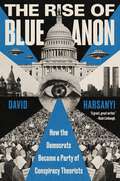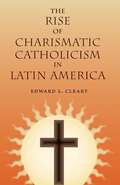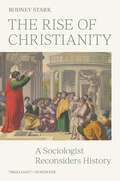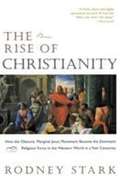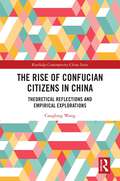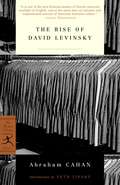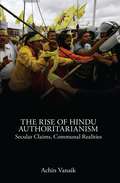- Table View
- List View
The Risalo of Shah Abdul Latif: Sufi Poetry from Sindh (Murty Classical Library of India)
by Shah Abdul LatifA landmark English translation of Sindhi literature’s most famous classic.Shah Abdul Latif’s Risalo, loosely translated as “the message,” is widely regarded as the pinnacle of Sindhi literature, cherished across South Asia and the diaspora. This collection of Sufi verses, originally crafted for musical performance in the eighteenth century, weaves a rich tapestry of mystical and divine love, drawing on both Islamic tradition and local Sindhi culture. Latif’s poetry also immortalizes timeless love stories, such as those of Sasui Punhun, Suhini Mehar (Sohni Mahiwal), and Lila Chanesar, which continue to captivate millions.Latif (1689–1752) is a revered Sufi saint whose shrine is a beloved pilgrimage site in present-day Pakistan. His Risalo reflects a deep commitment to bringing together Islamic as well as Hindu devotional and ascetic traditions, and includes verses celebrating the spirituality of yogis.This first authoritative translation into modern English introduces a new generation to one of the greatest treasures of Indo-Islamic literature.
The Rise Of Western Christendom: Triumph And Diversity, A. D. 200-1000 (Making Of Europe Series #5 (Tenth Anniversary Revised Edition))
by Peter Brown<P>This tenth anniversary revised edition of the authoritative text on Christianity’s first thousand years of history features a new preface, additional color images, and an updated bibliography. The essential general survey of medieval European Christendom, Brown’s vivid prose charts the compelling and tumultuous rise of an institution that came to wield enormous religious and secular power. <br>• Clear and vivid history of Christianity’s rise and its pivotal role in the making of Europe <br>• Written by the celebrated Princeton scholar who originated of the field of study known as ‘late antiquity’ <br>• Includes a fully updated bibliography and index
The Rise and Decline of American Religious Freedom
by Steven D. SmithFamiliar accounts of religious freedom in the United States often tell a story of visionary founders who broke from the centuries-old patterns of Christendom to establish a political arrangement committed to secular and religiously neutral government. These novel commitments were supposedly embodied in the religion clauses of the First Amendment. But this story is largely a fairytale, Steven Smith says in this incisive examination of a much-mythologized subject. He makes the case that the American achievement was not a rejection of Christian commitments but a retrieval of classic Christian ideals of freedom of the church and freedom of conscience. Smith maintains that the distinctive American contribution to religious freedom was not in the First Amendment, which was intended merely to preserve the political status quo in matters of religion. What was important was the commitment to open contestation between secularist and providentialist understandings of the nation which evolved over the nineteenth century. In the twentieth century, far from vindicating constitutional principles, as conventional wisdom suggests, the Supreme Court imposed secular neutrality, which effectively repudiated this commitment to open contestation. Rather than upholding what was distinctively American and constitutional, these decisions subverted it. The negative consequences are visible today in the incoherence of religion clause jurisprudence and the intense culture wars in American politics.
The Rise and Demise of Black Theology (Reclaiming Liberation Theology Ser.)
by Alistair KeeBlack Theology emerged in the 1960s as a response to black consciousness. In South Africa it is a critique of power; in the UK it is a political theology of black culture. The dominant form of Black Theology has been in the USA, originally influenced by Black Power and the critique of white racism. Since then it claims to have broadened its perspective to include oppression on the grounds of race, gender and class. In this book the author contests this claim, especially by Womanist (black women) Theology. Black and Womanist Theologies present inadequate analyses of race and gender and no account at all of class (economic) oppression. With a few notable exceptions Black Theology in the USA repeats the mantras of the 1970s, the discourse of modernity. Content with American capitalism it fails to address the source of the impoverishment of black Americans at home. Content with a romantic imaginaire of Africa, this 'African-American' movement fails to defend contemporary Africa against predatory American global ambitions.
The Rise and Fall of Adam and Eve
by Stephen GreenblattStephen Greenblatt, the National Book Award- and Pulitzer Prize-winning author, investigates the life of one of humankind's greatest stories. The Rise and Fall of Adam and Eve explores the enduring story of humanity's first parents, and through them, of Western civilization. Greenblatt explores the tremendous theological, artistic, and cultural creativity over the centuries that made Adam and Eve so profoundly resonant, and continues to make them, finally, so very "real" to millions of people even in the present. Be sure to read the photo captions which are placed after the Index as these are especially interesting in this book. Greenblatt gives equally full coverage to both believers and skeptics.
The Rise and Fall of Dispensationalism: How the Evangelical Battle over the End Times Shaped a Nation
by Daniel G. HummelA fascinating history of dispensationalism and its influence on popular culture, politics, and religion In The Rise and Fall of Dispensationalism, Daniel G. Hummel illuminates how dispensationalism, despite often being dismissed as a fringe apocalyptic movement, shaped Anglo-American evangelicalism and the larger American cultural imagination. Hummel locates dispensationalism&’s origin in the writings of the nineteenth-century Protestant John Nelson Darby, who established many of the hallmarks of the theology, such as premillennialism and belief in the rapture. Though it consistently faced criticism, dispensationalism held populist, and briefly scholarly, appeal—visible in everything from turn-of-the-century revivalism to apocalyptic bestsellers of the 1970s to current internet conspiracy theories. Measured and irenic, Hummel objectively evaluates evangelicalism&’s most resilient (and contentious) popular theology. As the first comprehensive intellectual-cultural history of its kind, The Rise and Fall of Dispensationalism is a must-read for students and scholars of American religion.
The Rise and Fall of Magic Wolf
by Timothy Taylor“A sumptuously written story about culinary ambition, restaurant-world vice, and the frailties of the heart.” — KEVIN CHONG, author of The Double Life of Benson YuRestaurateur Teo Wolf’s culinary fame is peaking just as a series of scandals and reckless decisions threaten to destroy everything.Teo’s life as a Paris brasserie apprentice is filled with challenges and triumphs, as well as all the regular abuses of slammed commercial kitchens. Still, he rises through the ranks, eventually returning to his hometown of Vancouver to open Rue Véron, a French restaurant that goes on to become a sensation. His second restaurant, Orinoco, is also successful. But on the cusp of opening his third, a news story breaks suggesting that his popular sous chef, Frankie, is a sexual predator.The media firestorm and subsequent public relations disaster threaten to destroy Teo’s empire, as well as his own personal life. And when the compounding consequences lead to unimaginable tragedy, Teo is left to question the impact of both individual action and people acting in great numbers.A RARE MACHINES BOOK
The Rise and Fall of Protestant Brooklyn: An American Story
by Glenn C. Altschuler Stuart M. BluminIn The Rise and Fall of Protestant Brooklyn, Stuart M. Blumin and Glenn C. Altschuler tell the story of nineteenth-century Brooklyn's domination by upper- and middle-class Protestants with roots in Puritan New England. This lively history describes the unraveling of the control they wielded as more ethnically diverse groups moved into the "City of Churches" during the twentieth century.Before it became a prime American example of urban ethnic diversity, Brooklyn was a lovely and salubrious "town across the river" from Manhattan, celebrated for its churches and upright suburban living. But challenges to this way of life issued from the sheer growth of the city, from new secular institutions—department stores, theaters, professional baseball—and from the licit and illicit attractions of Coney Island, all of which were at odds with post-Puritan piety and behavior. Despite these developments, the Yankee-Protestant hegemony largely held until the massive influx of Southern and Eastern European immigrants in the twentieth century. As The Rise and Fall of Protestant Brooklyn demonstrates, in their churches, synagogues, and other communal institutions, and on their neighborhood streets, the new Brooklynites established the ethnic mosaic that laid the groundwork for the theory of cultural pluralism, giving it a central place within the American Creed.
The Rise and Fall of the Afterlife: The 1995 Read-tuckwell Lectures At The University Of Bristol
by Jan N. BremmerBelief in the afterlife is still very much alive in Western civilisation, even though the truth of its existence is no longer universally accepted. Surprisingly, however, heaven, hell and the immortal soul were all ideas which arrived relatively late in the ancient world. Originally Greece and Israel - the cultures that gave us Christianity - had only the vaguest ideas of an afterlife. So where did these concepts come from and why did they develop?In this fascinating, learned, but highly readable book, Jan N. Bremmer - one of the foremost authorities on ancient religion - takes a fresh look at the major developments in the Western imagination of the afterlife, from the ancient Greeks to the modern near-death experience.
The Rise and Fall of the Bible: The Unexpected History of an Accidental Book
by Timothy BealA professor of religion offers an &“engrossing and excellent&” look at how the Good Book has changed—and changed the world—through the ages (Publishers Weekly, starred review). In a lively journey from early Christianity to the present, this book explores how a box of handwritten scrolls became the Bible, and how the multibillion-dollar business that has brought us Biblezines and Manga Bibles is selling down the Book&’s sacred capital. Showing us how a single official text was created from the proliferation of different scripts, Timothy Beal traces its path as it became embraced as the word of God and the Book of books. Christianity thrived for centuries without any Bible—there was no official canon of scriptures, much less a book big enough to hold them all. Congregations used various collections of scrolls and codices. As the author reveals, there is no &“original&” Bible, no single source text behind the thousands of different editions on the market today. The farther we go back in the holy text&’s history, the more versions we find. In calling for a fresh understanding of the ways scriptures were used in the past, the author of Biblical Literacy offers the chance to rediscover a Bible, and a faith, that is truer to its own history—not a book of answers, but a library of questions.
The Rise and Fall of the Christian Myth: Restoring Our Democratic Ideals
by Burton L. MackA preeminent scholar explores the evolution of the Christian worldview and argues that it no longer offers a satisfactory vision for our democratic, multicultural society This book is the culmination of a lifelong scholarly inquiry into Christian history, religion as a social institution, and the role of myth in the history of religions. Mack shows that religions are essentially mythological and that Christianity in particular has been an ever-changing mythological engine of social formation, from Roman times to its distinct American expression in our time. The author traces the cultural influence of the Christian myth that has persisted for sixteen hundred years but now should be much less consequential in our social and cultural life, since it runs counter to our democratic ideals. We stand at a critical impasse: badly splintered by conflicting groups pursuing their own social interests, a binding common myth needs to be established by renewing a truly cohesive national and international story rooted in our democratic and egalitarian origins, committed to freedom, equality, and vital human values.
The Rise and Fall of the English Christendom: Theocracy, Christology, Order and Power (Routledge Contemporary Ecclesiology)
by Bruce KayeEnglish Christendom has never been a static entity. Evangelism, politics, conflict and cultural changes have constantly and consistently developed it into myriad forms across the world. However, in recent times that development has seemingly become a general decline. This book utilises the motif of Christendom to illuminate the pedigree of Anglican Christianity, allowing a vital and persistent dynamic in Christianity, namely the relationship between the sacred and the mundane, to be more fundamentally explored. Each chapter seeks to unpack a particular historical moment in which the relations of sacred and mundane are on display. Beginning with the work of Bede, before focusing on the Anglo Norman settlement of England, the Tudor period, and the establishment of the church in the American and Australian colonies, Anglicanism is shown to consistently be a religio-political tradition. This approach opens up a different set of categories for the study of contemporary Anglicanism and its debates about the notion of the church. It also opens up fresh ways of looking at religious conflict in the modern world and within Christianity. This is a fresh exploration of a major facet of Western religious culture. As such, it will be of significant interest to scholars working in Religious History and Anglican Studies, as well as theologians with an interest in Western Ecclesiology.
The Rise and Fall of the Religious Left: Politics, Television, and Popular Culture in the 1970s and Beyond (Columbia Series on Religion and Politics)
by L. Benjamin RolskyFor decades now, Americans have believed that their country is deeply divided by “culture wars” waged between religious conservatives and secular liberals. In most instances, Protestant conservatives have been cast as the instigators of such warfare, while religious liberals have been largely ignored. In this book, L. Benjamin Rolsky examines the ways in which American liberalism has helped shape cultural conflict since the 1970s through the story of how television writer and producer Norman Lear galvanized the religious left into action.The creator of comedies such as All in the Family and Maude, Lear was spurred to found the liberal advocacy group People for the American Way in response to the rise of the religious right. Rolsky offers engaged readings of Lear’s iconic sitcoms and published writings, considering them as an expression of what he calls the spiritual politics of the religious left. He shows how prime-time television became a focus of political dispute and demonstrates how Lear’s emergence as an interfaith activist catalyzed ecumenical Protestants, Catholics, and Jews who were determined to push back against conservatism’s ascent. Rolsky concludes that Lear’s political involvement exemplified religious liberals’ commitment to engaging politics on explicitly moral grounds in defense of what they saw as the public interest. An interdisciplinary analysis of the definitive cultural clashes of our fractious times, The Rise and Fall of the Religious Left foregrounds the foundational roles played by popular culture, television, and media in America’s religious history.
The Rise and Fall of the Shah: Iran from Autocracy to Religious Rule
by Amin SaikalOn November 4, 1979, when students occupied the American Embassy in Tehran and subsequently demanded that the United States return the Shah in exchange for hostages, the deposed Iranian ruler's regime became the focus of worldwide scrutiny and controversy. But, as Amin Saikal shows, this was far from the beginning of Iran's troubles. Saikal examines the rule of Mohammad Reza Shah Pahlavi, especially from 1953 to 1979, in the context of his regime's dependence on the United States and his dreams of transforming Iran into a world power. Saikal argues that, despite the Shah's early achievements, his goals and policies were full of inherent contradictions and weaknesses and ultimately failed to achieve their objectives. Based on government documents, published and unpublished literature, and interviews with officials in Iran, Britain, and the United States, The Rise and Fall of the Shah critically reviews the domestic and foreign policy objectives--as well as the behavior--of the Shah to explain not only what happened, but how and why. In a new introduction, Saikal reflects on what has happened in Iran since the fall of the Shah and relates Iran's past to its political present and future.
The Rise of Baptist Republicanism (Choice Outstanding Academic Bk)
by Oran P SmithA Choice Outstanding Academic Book By championing the ideals of independence, evangelism, and conservism, the Southern Baptist Covention (SBC) has grown into the largest Protestant denomination in the country. The Convention's mass democratic form of church government, its influential annual meetings, and its sheer size have made it a barometer for Southern political and cultural shift. Its most recent shift has been starboard-toward fundamentalism and Republicanism. While the Convention once ofered a happy home to Harry Truman, Jimmy Carter, and church-state separationists, in the past two decades the SBC has become an uncomfortable institution for Democrats, progressive theologians, and other moderate voices. Current SBC member-heroes include Senators Trent Lott and Jesse Helms. Despite this seeming marginalization, Southern Baptist politicians have grown from political obscurity to occupying the four highest positions in the constitutional order of succesion to the presidency. President Bill Clinton, Vice President Al Gore, Senate President pro-tempore Strom Thurmond, and House Speaker Newt Gingrich are all Southern Baptists. In its emerging Republicanism, the SBC has taken on characteristics of its more active fellow travelers in the Christian Right, forging alliances with former enemies (African Americans amd Roman Catholics), playing presidential politics, establishing a Washington lobbying presence, working the political grassroots, and declaring war on Walt Disney. Each of these missions has been accomplished with calculating political precision.The Rise of Baptist Republicanism traces the Republicanization of the SBC's Republicanism in the context of the rise of the Fundamentalist Right and the emergence of a Republican majority in the South. Describing the SBC's political roots, Oran P. Smith contrasts Baptist Republicans with the rest of the Christian Right while revealing the theological, cultural, and historical factors which have made Southern Baptists receptive to Republican/Fundamentalist Right influences. The book is a must read for anyone wishing to understand the intersection of religion and politics in America today.
The Rise of Benedict XVI: The Inside Story of How the Pope Was Elected and Where He Will Take the Catholic Church
by John L. Allen Jr."Commendable and balanced ... With crisp writing and an amazing attention to detail, Allen brings readers inside the papal jockeying, covering the days of mourning and the conclave." --The Los Angeles Times. "A welcome contribution to understanding the new pontificate ... The Rise of Benedict XVI is a useful chronicle that packs a lot into relatively few pages." --Richard John Neuhaus, First Things. "For a current look at the new papacy, Allen is the person to read. He is fair, free from the oracular pomposity of some American commentators, and, as always, highly readable." --Commonweal. On April 18, 2005, the College of Cardinals of the Roman Catholic Church gathered to elect a successor to Pope John Paul II. Faced with several potential candidates, the cardinals made a bold choice, entrusting the Keys of the Kingdom to 78-year-old Cardinal Joseph Ratzinger of Germany, a man whose views on the challenges facing the Church and the broader culture could not be more unambiguous, or controversial. Questions arose as the world watched while Ratzinger was installed as Pope Benedict XVI. No one can tell the story of exactly what took place during the closed doors meeting, known as the conclave, when Cardinals from around the world cast their votes for the next pope, better than John L. Allen, Jr. As a correspondent for National Catholic Reporter and a Vatican analyst for CNN and National Public Radio, Allen has spent years covering Vatican politics and personalities, and his unique access to Roman halls of power has enabled him to write the ultimate behind-the-scenes account of the election of Pope Benedict XVI.
The Rise of BlueAnon: How the Democrats Became a Party of Conspiracy Theorists
by David HarsanyiDavid Harsanyi delves into the mindset of people who think Republicans would usher in the Handmaid's Tale and who compare Trump's Madison Square Garden rally to a pro-Nazi rally held there eight decades earlier. In The Rise of BlueAnon, David Harsanyi reveals how the left has been consumed by a uniquely dangerous and delusional brand of conspiracy theories. And unlike those on the right, the Left’s conspiracy theories are rarely kept in check by mainstream institutions. How many Democrats are donning tinfoil hats? Way more than the media will admit:· A recent poll found nearly twice as many Democrats as Republicans believed “the Holocaust is a myth.” · Historically, Democrats are more likely to be 9/11 “Truthers." · Democrats have been accusing Republicans of stealing elections since Reagan defeated Carter.· Despite their lawn signs declaring, “science is real,” Democrats are twice as likely to believe in astrology as Republicans. · Most of the Americans who believe that alien spacecraft are observing our planet right now are Democrats. · Democrats have spread the most successful conspiracy theory in American history: The Trump-Russia collusion hoax. From shrieks that we’re just one election away from living in The Handmaid’s Tale, to shrills that the world will end in 12 years from a corporation-caused climate catastrophe, Democrats have whipped themselves up with unfounded fears and falsehoods.Virtually all mainstream media experts, pundits, and late-night talk-show hosts claim that conservatives are a bunch of unhinged conspiracy theorists. The Rise of BlueAnon is a fun, hard-hitting, and insightful refutation of this myth, and it shows why so many Democrat accusations are, in reality, projections.
The Rise of Charismatic Catholicism in Latin America
by Edward L. Cleary"Latin America in the twenty-first century is no longer the way we have always imagined it, and nowhere are the region’s vast changes more evident than in the field of religion. Ed Cleary brings his readers into the churches and communities of Latin America to introduce them to the Catholic Charismatic Movement, the biggest and most important religious shift taking place in the region in recent decades."--Kenneth P. Serbin, University of San DiegoMuch has been made of the dramatic rise of Protestantism in Latin America. Many view this as a sign that Catholicism’s primacy in the region is at last beginning to wane. Overlooked by journalists and scholars has been the parallel growth of Charismatic, or Pentecostal, Catholicism in the region. Edward Cleary offers the first comprehensive treatment of this movement, revealing its importance to the Catholic Church as well as the people of Latin America.Catholic Charismatics have grown worldwide to several hundred million, among whom Latin Americans number approximately 73 million participants. These individuals are helping the church become more extroverted by drawing many into evangelizing and mission work. The movement has rapidly acquired an indigenous Latin American character and is now returning to the United States through migration and is affecting Catholicism in the United States.Cleary has witnessed firsthand the birth and maturing of the Catholic Charismatic Renewal in Latin America as both a social scientist and a Dominican missionary. Drawing upon important findings of Latin American scholars and researchers, he explores and analyzes the origins of the most important Catholic movement in Latin America and its notable expansion to all countries of the region, bringing with it unusual vitality and notable controversy about its practices.Edward L. Cleary, professor of political science and director of the Latin American studies program at Providence College and visiting scholar at Stanford University, has authored or edited eleven books, most recently Conversion of a Continent: Religious Change in Latin America.
The Rise of Christianity: A Sociologist Reconsiders History
by Rodney StarkThe idea that Christianity started as a clandestine movement among the poor is a widely accepted notion. Yet it is one of many myths that must be discarded if we are to understand just how a tiny messianic movement on the edge of the Roman Empire became the dominant faith of Western civilization. In a fast-paced, highly readable book that addresses beliefs as well as historical facts, Rodney Stark brings a sociologist's perspective to bear on the puzzle behind the success of early Christianity. He comes equipped not only with the logic and methods of social science but also with insights gathered firsthand into why people convert and how new religious groups recruit members. He digs deep into the historical evidence on many issues--such as the social background of converts, the mission to the Jews, the status of women in the church, the role of martyrdom--to provide a vivid and unconventional account of early Christianity. The author plots the most plausible curve of Christian growth from the year 40 to 300. By the time of Constantine, Christianity had become a considerable force, with growth patterns very similar to those of modern-day successful religious movements. An unusual number of Christian converts, for example, came from the educated, cosmopolitan classes. Because it offered a new perspective on familiar concepts and was not linked to ethnicity, Christianity had a large following among persons seeking to assimilate into the dominant culture, mainly Hellenized Jews. The oversupply of women in Christian communities--due partly to the respect and protection they received--led to intermarriages with pagans, hence more conversions, and to a high fertility rate. Stark points out, too, the role played by selflessness and faith. Amidst the epidemics, fires, and other disasters that beleaguered Greco-Roman cities, Christian communities were a stronghold of mutual aid, which resulted in a survival rate far greater than that of the pagans. In the meantime, voluntary martyrdom, especially a generation after the death of Christ, reinforced the commitment of the Christian rank and file. What Stark ultimately offers is a multifaceted portrait of early Christianity, one that appeals to practical reasoning, historical curiosity, and personal reflection.
The Rise of Christianity: How the Obscure, Marginal Jesus Movement Became the Dominant Religious Force in the Western World in a Few Centuries
by Rodney StarkSociologist Rodney Stark combines his expertise in social science with historical evidence to offer a provocative report. Stark finds that early Christianity attracted the privileged rather than the poor, and that Christianity's astounding dominance of the Western world arose from its offer of a better, more secure way of life.
The Rise of Confucian Citizens in China: Theoretical Reflections and Empirical Explorations (Routledge Contemporary China Series)
by Canglong WangThis book explores the relationship between Confucianism and citizenship and the rise of Confucian citizens in contemporary China. Combining theoretical and empirical approaches to the topic, the book constructs new frameworks to examine the nuances and complexities of Confucianism and citizenship, exploring the process of citizen-making through Confucian education. By re-evaluating the concept of citizenship as a Western construct and therefore challenging the popular characterization of Confucianism and citizenship as incompatible, this book posits that a new type of citizen, the Confucian citizen, is on the rise in 21st-century China. The book’s clear, accessible style makes it essential reading for students and scholars interested in citizenship, Confucianism and Chinese studies, and those with an interest in religion and philosophy more generally.
The Rise of David Levinsky (Modern Library Classics)
by Abraham Cahan Seth LipskyThe Rise of David Levinsky, written by the legendary founder and editor of the Jewish Daily Forward, is an early Jewish-American classic. According to the scholar Sam B. Girgus, "The novel is more than an important literary work and cultural document. It forms part of the traditional ritual of renewal of the American Way."First published in 1917, Abraham Cahan's realistic novel tells the story of a young talmudic scholar who emigrates from a small town in Russia to the melting pot of turn-of-the-century New York City. As the Jewish "greenhorn" rises from the depths of poverty to become a millionaire garment merchant, he discovers the unbearably high price of assimilation.
The Rise of False Messiahs (Left Behind: The Kids #35)
by Tim Lahaye Jerry B. Jenkins Chris FabryBook 35. As the world spins out of control, the Global Community goes on the attack. Bounty hunters looking for easy money capture Judd and Lionel in South Carolina. Will they escape or face the blade? In Petra, Sam Goldberg and Mr. Stein come up with a daring rescue plan. Their travels will allow them to witness a gruesome display of evil and a miracle of God. Vicki Byrne prays for Judd and Lionel and tries to help her pregnant friend Cheryl Tifanne. When the girl becomes ill, Vicki wonders if her baby will survive. Join the Young Tribulation Force as they battle the most evil forces the planet has ever seen.
The Rise of Hindu Authoritarianism: Secular Claims, Communal Realities
by Achin VanaikThe definitive analysis of Hindu nationalism in contemporary India and the challenges for the radical LeftWith the Hindu nationalist BJP now replacing the Congress as the only national political force, the communalization of the Indian polity has qualitatively advanced since the earlier edition of this book in 1997. This edition has been substantially reworked and updated with several new chapters added. Hindutva’s rise necessitates a more critical take on mainstream secular claims, ironically reinforced by liberal–left sections discovering special virtues in India’s ‘distinctive’ secularism. The careful evaluation of the ongoing debate on ‘Indian fascism’ has resonances for the broader debate about how best to assess the dangers of the far right’s rise in other liberal democracies. A study follows of how Hindutva forces are pursuing their project of establishing a Hindu Rashtra and how to thwart them through a wider transformative struggle targeting capitalism itself.From the Trade Paperback edition.
